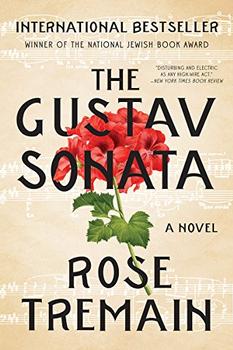Summary | Excerpt | Reviews | Beyond the book | Read-Alikes | Genres & Themes | Author Bio

Critics' Opinion:
Readers' Opinion:
First Published:
Sep 2016, 256 pages
Paperback:
Sep 2017, 256 pages
 Book Reviewed by:
Book Reviewed by:
Kate Braithwaite
Buy This Book
The Gustav Sonata is a moving novel which describes the lifelong friendship between two Swiss men. Gustav Perle and Anton Zweibel are only five years old when they first meet in 1948. They are both quiet, thoughtful children and neither has siblings. While Anton's Jewish family members live in relative financial comfort and focus on the boy's potential future as a concert pianist, Gustav and his bitter, widowed mother, Emilie — who blames the death of her husband on Jewish people in general — struggle to have enough to eat.
The novel has three distinct time frames. In the first, we follow the boys until they are around ten years old. The book then moves back in time and explores the lives and marriage of Gustav's parents during World War II, explaining Emilie's hatred of the Jews and her dismay at Gustav's friendship with Anton. Finally, the narrative shifts forward to 1992 and tells the rest of Gustav and Anton's story from their mid-forties onwards.
Rose Tremain is a tremendous writer and her literary powers are displayed to great effect in this novel. She is a master at leaving gaps for the reader to fill in and really feel what is happening. For example, fairly early in the story, the Zweibels invite Gustav to go on holiday with them to Davos. Emilie says no at first, but hours later Gustav can see she has been crying. Over dinner she says that she sees it would be unkind not to let him go but still he has to wait for confirmation, "as though the word 'yes' was buried in her throat, deep beneath the mouthful of pie." It is only when she says that he will see how gentle the climate is there that Gustav knows he has her permission. Of course Gustav is only a boy, and the reader experiences events from his young perspective, but it is very clear how difficult this moment is for his mother, even though we don't yet know why. Later, when Tremain switches to the story of Emilie's life, the reader learns about her past and how important Davos is to her, making this moment even more poignant in retrospect.
The part of the novel concerning the lives of Gustav's parents is particularly gripping and full of insight into the effects of World War II in Switzerland. This central section almost feels as if it merits a novel of its own, separate from the story about Gustav and Anton's changing relationship. It is also more dramatic – Gustav is a very passive character in comparison to his parents – and the two sections where he features are somewhat lackluster in comparison. Although I enjoyed the conclusion to the story of Gustav and his friend Anton, I felt that there were not enough scenes of them together, particularly in the section when they are adults, to provide the emotional punch Tremain was aiming for.
A touch sad, The Gustav Sonata is a gentle novel about love and friendship, changing and developing over a lifetime.
![]() This review
first ran in the October 5, 2016
issue of BookBrowse Recommends.
This review
first ran in the October 5, 2016
issue of BookBrowse Recommends.

If you liked The Gustav Sonata, try these:

by Romain Gary, Miranda Richmond Mouillot
Published 2019
Romain Gary's bittersweet final masterpiece, a novel of courage and resistance - never before in English.

by Edouard Louis
Published 2018
An autobiographical novel about growing up gay in a working-class town in Picardy.





The Flower Sisters
by Michelle Collins Anderson
From the new Fannie Flagg of the Ozarks, a richly-woven story of family, forgiveness, and reinvention.

The House on Biscayne Bay
by Chanel Cleeton
As death stalks a gothic mansion in Miami, the lives of two women intertwine as the past and present collide.

The Funeral Cryer by Wenyan Lu
Debut novelist Wenyan Lu brings us this witty yet profound story about one woman's midlife reawakening in contemporary rural China.
Your guide toexceptional books
BookBrowse seeks out and recommends the best in contemporary fiction and nonfiction—books that not only engage and entertain but also deepen our understanding of ourselves and the world around us.